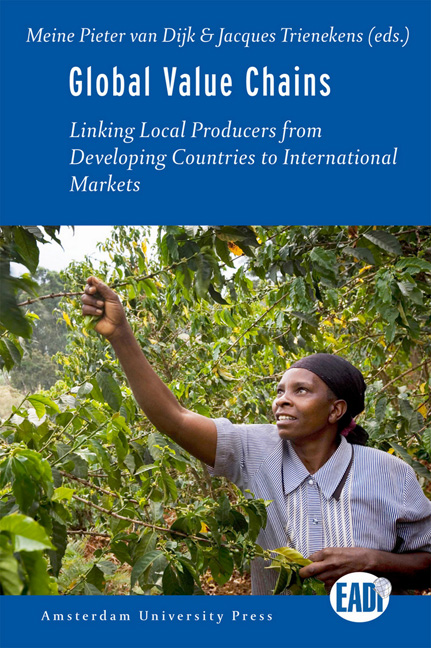Book contents
- Frontmatter
- Contents
- Part I Theoretical Contributions
- Part II Local Agricultural Value Chains
- Part III International Agricultural Value Chains
- Part IV Value Chains in the Industrial and Services Sector
- Part V Conclusions: Upgrading Value Chains in Developing Countries
- About the Authors
- Index
- Miscellaneous Endmatter
5 - Bush-to-energy Value Chains in Namibia: Institutional Challenges for Pro-poor Rural Development
Published online by Cambridge University Press: 19 January 2021
- Frontmatter
- Contents
- Part I Theoretical Contributions
- Part II Local Agricultural Value Chains
- Part III International Agricultural Value Chains
- Part IV Value Chains in the Industrial and Services Sector
- Part V Conclusions: Upgrading Value Chains in Developing Countries
- About the Authors
- Index
- Miscellaneous Endmatter
Summary
Introduction
Modern bioenergy production has received a lot of attention in recent years. There are different reasons for that. On the one hand, modern bioenergy is believed to play an important role in the transformation of existing fossil-fuel energy systems to reduce global greenhouse gas (GHG) emissions (see WBGU, 2008). Modern energy is further seen as a requirement for social and economic development (World Bank, 2009a). On the other hand, recent strong criticism of bioenergy production, particularly larger-scale liquid biofuels, concerning potential negative environmental and social impacts has shown that bioenergy also brings along substantial challenges (see Cotula et al., 2008).
From a development-policy point of view, the concern that modern bioenergy production competes with food production and hampers food security is a particularly critical issue. Two levels of competition can be distinguished: At the global level via world food markets and prices, and at the local level where investments to produce bioenergy feedstock may compete with local food production. Whereas at the global level biofuel programs of industrial countries (USA, European Union) are in the center of the debate, for the local level Sub-Saharan Africa (SSA) has been in the focus for three reasons: a) food insecurity is particularly widespread and subsistence food production and local markets are the main source of food security, b) most recent foreign investments in land and biofuels in developing countries have targeted the region, and c) the need for a transformation towards modern energy use is the strongest in the region, since a majority of the population still relies on traditional, unsustainable and unhealthy fuel wood for most energy uses, notably cooking and heating (see World Bank, 2009a).
This chapter addresses these concerns about bioenergy for rural development in SSA by investigating several bush-to-energy value chains in Namibia. The purpose of the chapter is threefold: First, it tries to understand the various factors affecting the viability of modern bioenergy production. Second, it seeks to identify potential impacts on rural development and food security. Third, it intends to derive policy options to influence the value chains’ competitiveness as well as its environmental sustainability and social inclusiveness.
- Type
- Chapter
- Information
- Global Value ChainsLinking Local Producers from Developing Countries to International Markets, pp. 89 - 116Publisher: Amsterdam University PressPrint publication year: 2012



